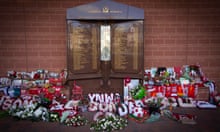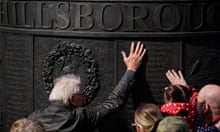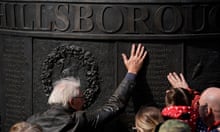A crowdfunding appeal has been set up for five people whose relatives died in the 1989 Hillsborough disaster, after a judge ordered them to pay the £28,000 legal costs of former South Yorkshire police chief constable David Crompton.
Lady Justice Sharp made the costs order after refusing an application by the five family members to be formally involved in Crompton’s appeal against his dismissal by the South Yorkshire police and crime commissioner Alan Billings, last year.
Billings called on Crompton to resign after the verdicts of the jury at the new inquests into the disaster. The inquests ruled that the 96 people who died at Hillsborough were unlawfully killed due to the failings of South Yorkshire police and exonerated Liverpool supporters of any misbehaviour which police alleged contributed to the dangerous situation at the FA Cup semi-final.
Bereaved families severely criticised Crompton afterwards, arguing that South Yorkshire police had continued to allege that supporters misbehaved, despite Crompton having apologised for the force’s failings in 2012.
Billings, who after his election as the PCC supported Crompton throughout the inquests, based his subsequent sacking not on the force’s conduct of the case but on three words in a press release issued afterwards. In that statement, the force said Crompton “unequivocally accepted the jury’s conclusions” and claimed it had never sought to defend its officers’ failures but said those failures had to be put into the context of “other contributory factors”.
Crompton’s application for a judicial review of Billings’s decision, due to be heard later this month, is supported by the chief inspector of constabulary, Tom Winsor, who has argued the sacking was unfair and disproportionate and described as “simply unreal” Billings’s argument that the press statement had made Crompton’s position untenable. The five family members based their legal application on arguing that they could provide evidence about the distress the South Yorkshire police case caused them and that it significantly lengthened the inquests.
Their barrister, Kate Stone, had urged Sharp, sitting with Mr Justice Garnham, not to award costs against the families, saying: “They have no public funding and no costs protection; there is a small amount of charitable funding in place to make the application, and that is all there is. In my submission, the court should be slow to make an order in those circumstances, particularly given [the family members’] status as victims of a historic miscarriage of justice.”
The judges, however, ruled that the families’ evidence about the conduct of the inquests would not be relevant to the issues in Crompton’s dismissal, and having dismissed their application, ordered them to pay Crompton’s costs. His lawyers, Kingsley Napley, are understood to be funded by insurance under a policy Crompton paid for himself while he was chief constable. The bill for his representation, £28,000, was described as excessive by the families’ solicitor, Elkan Abrahamson, who said he was “staggered” by the figure, which will now be assessed by the court.
Abrahamson said that the families believed the judicial review of the South Yorkshire police press statement needed to understand the context of the force’s conduct during the inquests. Crompton’s lawyers argued throughout that the legal basis for the application was weak and said they would seek to have his costs paid if the families lost. Abrahamson said that he believed the likelihood of the court ordering the families to actually pay the legal costs was “very low”.
The families’ legal representation during the two-year inquests was paid for by the Home Office, and public funding continues while the Crown Prosecution Service is considering potential criminal charges against 23 individuals and organisations. However, it did not extend to the application for involvement in Crompton’s judicial review.
Families had to fund their own lawyers after the disaster, with 42 paying £3,000 each for a single barrister, who was opposed by publicly funded lawyers for the police and other organisations at the first inquest. Its jury returned a verdict of accidental death in March 1991, leading to a 25-year campaign to overturn it.
Abrahamson said a friend of one of the families is intending to set up a crowdfunding appeal to meet the costs order imposed by the court.









